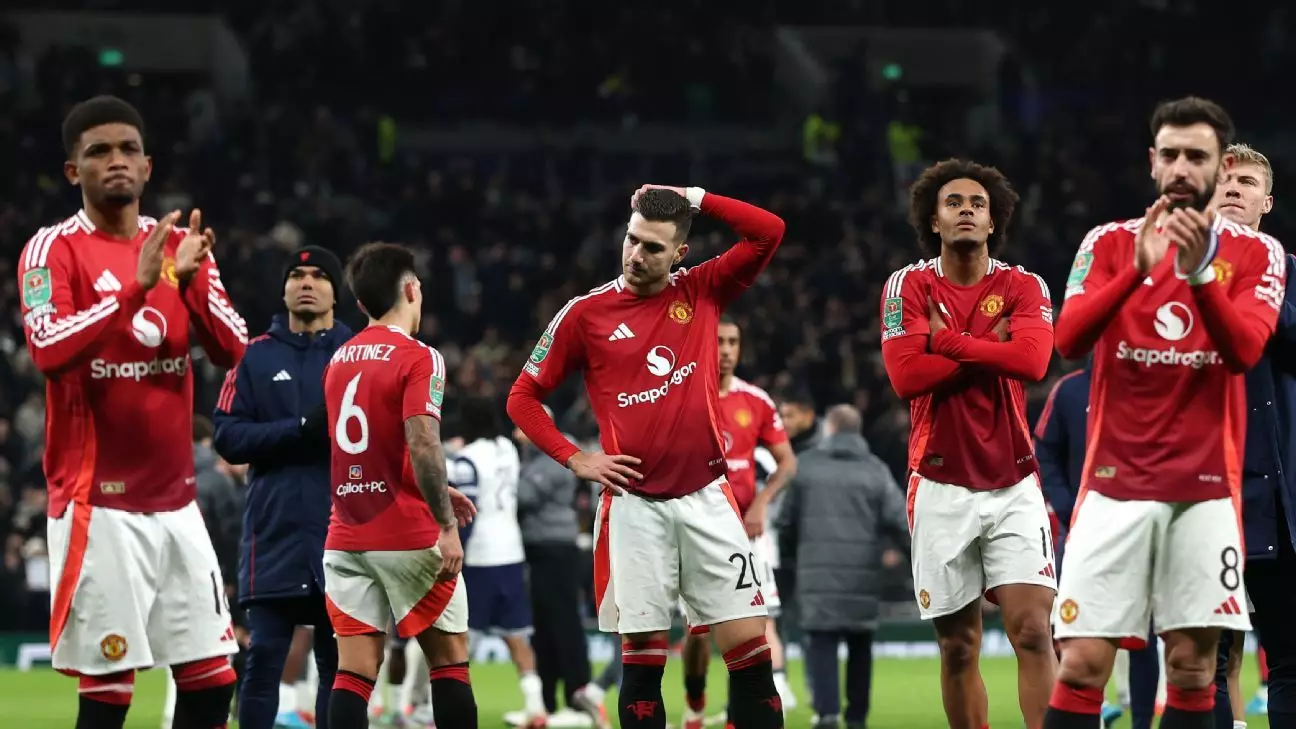In an unforgettable match at the Tottenham Hotspur Stadium, Tottenham edged out Manchester United with a thrilling 4-3 victory in the Carabao Cup quarter-finals. The encounter wasn’t just a showcase of skill and strategy but also highlighted the vulnerabilities of both teams—particularly regarding game management and defensive solidity.
The atmosphere was electric as Tottenham aimed to secure a spot in the semifinals, and it was Dominic Solanke who provided the breakthrough. His well-placed finish in the 15th minute set the tone for what was expected to be a comfortable evening for Spurs. However, for Manchester United, the opening phase was marked by missed opportunities and a lackluster defensive response. The visitors controlled possession but failed to capitalize, leaving them trailing at halftime despite being the better team during that period.
This match steppe into chaos just after the break when Spurs doubled their lead with a brace from Dejan Kulusevski. Looking at the game, one can certainly say that United’s defensive frailties were glaringly evident, particularly from Lisandro Martínez, whose errors allowed Tottenham to exploit them. His weak clearance almost directly played into Kulusevski’s hands, exposing severe issues in United’s defensive cohesion and decision-making.
Faced with a seemingly insurmountable 3-0 deficit, United manager Ruben Amorim made pivotal changes, introducing Joshua Zirkzee, Amad Diallo, and Kobbie Mainoo. Zirkzee immediately altered the course of the match, netting a quick goal that shook Spurs out of their complacency. Forster, Spurs’ goalkeeper, became an easy target for criticism after a couple of uncharacteristic mistakes that gifted United a pathway back into the game.
As tensions heightened, Tottenham’s supposed cruise towards victory morphed into a frenzied scramble for survival. The mental aspect of football became glaringly apparent, particularly for Forster, who seemed visibly rattled after conceding. His hesitancy in defense contrasted starkly with United’s newfound energy following their substitutions, and this juxtaposition brought the match to a captivating crescendo.
Tottenham managed to restore some semblance of control when Son Heung-min’s corner, curiously misjudged by Altay Bayindir, found the back of the net in the 88th minute. This goal rejuvenated the crowd and seemingly secured Spurs’ advantage with a flicker of safety. Yet, the resilient spirit of United surged one last time when Jonny Evans scored a headed goal in the dying moments of stoppage time, reigniting hopes of an improbable equalizer.
What transpired in those final moments was a powerful reminder of how quickly momentum can shift in football. Despite the victory, Tottenham’s performance raised eyebrows concerning their defensive solidity and fragility under pressure, leading to more questions regarding their ability to handle high-stakes matches.
In the aftermath, Tottenham manager Ange Postecoglou reflected on the result with a tempered response. While he acknowledged that securing a trophy could help ease discontent among fans, he emphasized the importance of building a sustainable team capable of achieving consistent success, cautioning against letting one cup win overshadow more systemic issues within the club.
The whispers of unrest among the Tottenham faithful regarding chairman Daniel Levy’s management amplified throughout the match. Even as the team celebrated on the pitch, discontent simmered within the stands, focusing on the club’s perceived lack of ambition in transfers and a long-standing hunger for trophies. A potential semifinal clash could yield a glimmer of hope, but the specter of fan frustration lingers, demanding accountability and ambition from the leadership.
Amorim, on the other hand, faces his challenges. The match not only exposed his team’s defensive frailties but also underscored the pressing need for a more reliable goal-scoring front. As the United faithful inch closer to a breaking point—what with Rashford’s exclusion from the squad and rising discontent over the club’s direction—answers must be swiftly sought to quell the shadows of uncertainty creeping into Old Trafford.
The thrilling encounter showcased the highs and lows of football, encapsulating the unpredictability of cup competitions. As both teams step back to evaluate their performances, it will be essential for Spurs to build on their progression and for Manchester United to address their fundamental shortcomings. The road ahead is fraught with challenges, but the lessons learned from this match could serve as invaluable stepping stones toward future success—or potential downfall. Ultimately, the night served as both a warning and a wake-up call, etching reminders of the stakes involved in this stunning competition.

